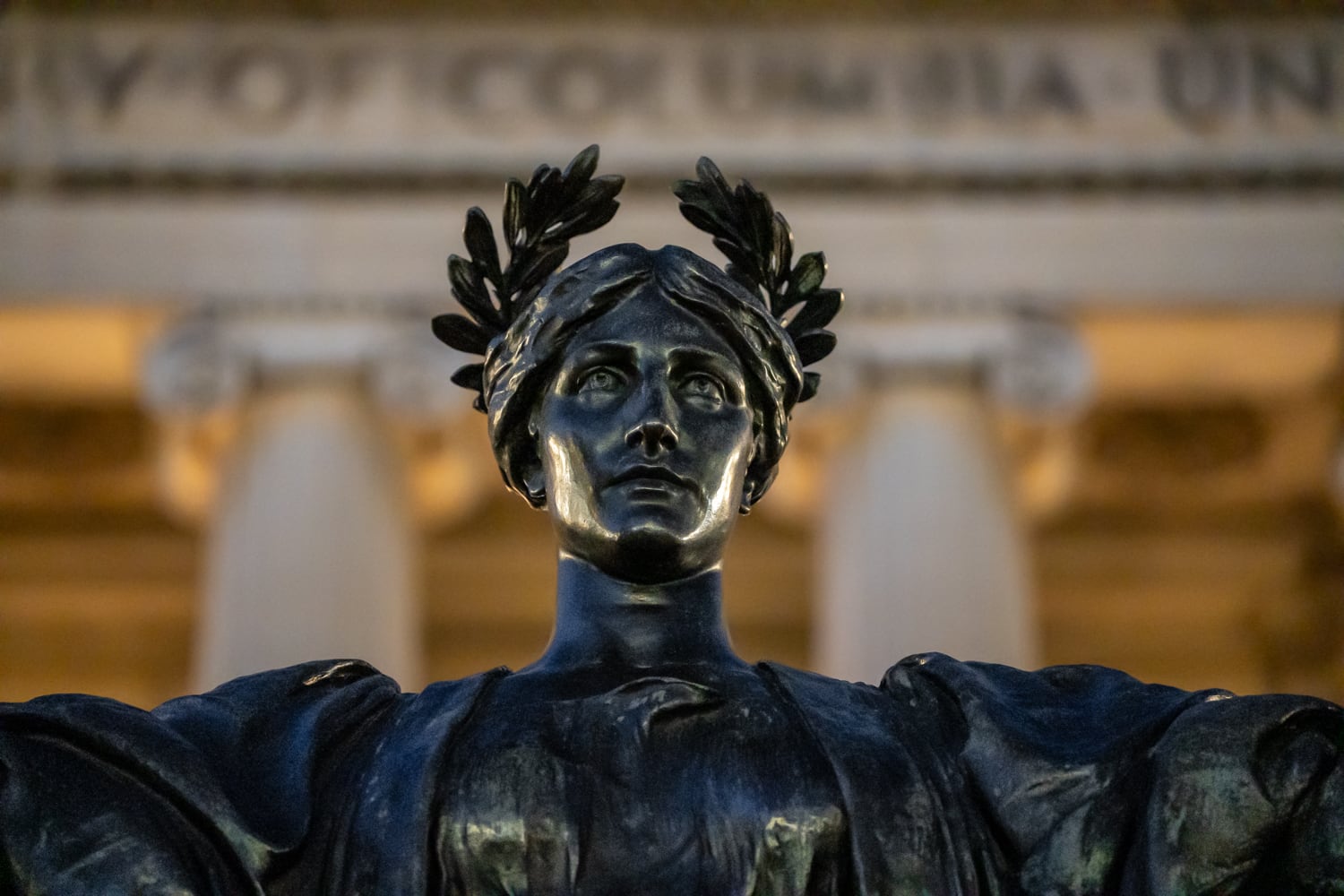News | Administration
Columbia ‘will not divest from Israel,’ negotiators fail to come to agreement, Shafik announces
Shafik urged encampment participants to “voluntarily disperse” as Columbia begins to “explore alternative internal options to end this crisis as soon as possible.”

By Gabriella Gregor Splaver / Senior Staff PhotographerColumbia University Apartheid Divest wrote in a Sunday substack post providing an update on negotiations and describing the University’s offers as “unacceptable.”By Noah Bernstein and Sarah Huddleston • April 29, 2024 at 12:50 PM
By Noah Bernstein and Sarah Huddleston • April 29, 2024 at 12:50 PM
Updated on April 29 at 10:41 a.m.
Columbia “will not divest from Israel,” and negotiators “were not able to come to an agreement,” University President Minouche Shafik announced in a Monday morning email to the Columbia community.
She “urge[ed] those in the encampment to voluntarily disperse” and wrote that the University is now “consulting with a broader group in our community to explore alternative internal options to end this crisis as soon as possible.”
Negotiations between members of the administration, the University Senate, and student protesters have been ongoing throughout the past week. Last Tuesday, the University announced a midnight deadline for reaching an agreement before Columbia began to explore “alternative options for clearing the West Lawn.” Soon after midnight, student negotiators left the table and vowed to not return without a promise of “good faith bargaining and protections for nonviolent protesters against police and military violence.” Hours later, the University announced a 48-hour extension on talks.
The email detailed several offers put forth by the University, including an offer to develop an “expedited timeline” for divestment proposals submitted to the Advisory Committee for Socially Responsible Investments, the body that oversees divestment decisions. It also proposed to establish a process by which students can access a list of Columbia’s direct investment holdings and “increase the frequency of updates to that list.”
Other offers outlined in the email include the assembly of a faculty committee to address ongoing concerns regarding the state of academic freedom. Shafik also wrote that the University “offered to make investments in health and education in Gaza, including supporting early childhood development and support for displaced scholars” and to start a conversation “on access and financial barriers to academic programs and global centers.”
“The university’s goal for the talks was a collaborative resolution with the protestors that would result in the orderly removal of the encampment from the lawn,” Shafik wrote. “The students also were asked to commit going forward to following the university’s rules, including those on the time, place, and manner for demonstrations and events.”
The email does not address amnesty for disciplined students, one of the three stated goals of the “Gaza Solidarity Encampment,” which is now approaching its two-week mark. Protesters pledged to remain until the University divests from companies with ties to Israel, provides financial transparency on its holdings, and grants amnesty for disciplined pro-Palestinian students.
Columbia University Apartheid Divest wrote in a Sunday substack post providing an update on negotiations and describing the University’s offers as “unacceptable.” CUAD wrote that “Proposals made to ACSRI are non-binding. This offer amounts to a mere suggestion to the Board of Trustees, which they are authorized to ignore.” The coalition also demanded that the University provide a method to access both direct and indirect financial holdings and cease the opening of the Tel Aviv Global Center entirely.
CUAD further called for “full amnesty for all, without self-identification – nothing less.” CUAD wrote that Columbia offered to provide amnesty to suspended students involved in the April 17 and April 18 encampment through “an attestation process.” Those students would remain on probation until Dec. 31, 2024, according to CUAD.
“The University has openly admitted to surveilling students involved in the current encampment, and has stated that they would face a disciplinary process if they fail to identify themselves,” CUAD wrote. “Furthermore, the University still withholds the right to punish students who do identify themselves for any actions it deems a ‘violation of policies.’ Finally, the University’s offer is contingent on the camp being dismantled without noise and the ejection of non-affiliates.”
Barnard President Laura Rosenbury forwarded Shafik’s message to the Barnard College community, “urging people to leave the encampment on Columbia’s lawn.” She wrote that students who need “support during this time, including assistance in leaving the encampment” can email Leslie Grinage, Barnard College dean and vice president for campus life and student experience.
“I reiterate my strong respect for the right to demonstrate, but we must make certain that our community is a safe and welcoming place for all,” Rosenbury wrote.
Shafik’s email comes as her newly minted administration faces intense scrutiny. Many students and faculty have condemned Shafik for her decision to authorize the New York Police Department to clear the encampment on April 18, leading to the arrest of 108 demonstrators. Meanwhile, others, including House Speaker Mike Johnson (R-La.), have critiqued Shafik’s handling of on-campus antisemitism, calling for her resignation.
“We also do not want to deprive thousands of students and their families and friends of a graduation celebration,” Shafik wrote. “Please recall that many in this graduating class did not get a celebration when graduating from high school because of the pandemic, and many of them are the first in their families to earn a university degree.”
“We owe it to all of our graduates and their loved ones to honor their achievement,” she added.
Deputy News Editor Noah Bernstein can be contacted at noah.bernstein@columbiaspectator.com. Follow Spectator on X @ColumbiaSpec.
University News Editor Sarah Huddleston can be contacted at sarah.huddleston@columbiaspectator.com. Follow Spectator on X @ColumbiaSpec.
Want to keep up with breaking news? Subscribe to our email newsletter and like Spectator on Facebook.
More In News
Editor's Picks

